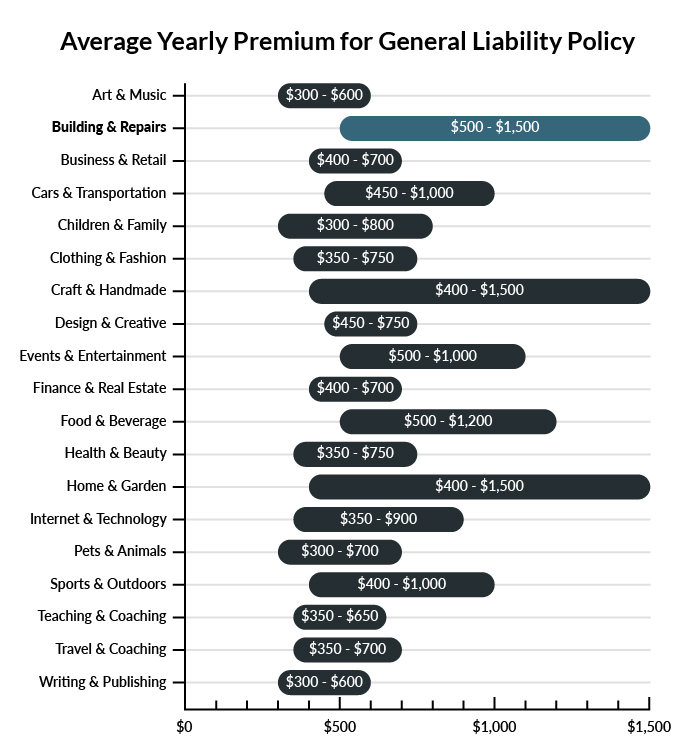Countertop Business Insurance
Getting insurance for your countertop business is essential.
Countertop businesses need to be protected against things like personal injury, breach of contract, and property damage claims.
For example, you install a countertop in someone’s home and damage something in the kitchen, or a loosely-installed countertop injures a client.
We’ll help you find the most personalized and affordable coverage for your unique business.

Recommended: Ergo Next Insurance is dedicated to matching small businesses with the right policy at the best price.
Best Insurance for a Countertop Business
General liability insurance is — generally speaking — one of the most important insurance policies for countertop businesses.
Some of the risks general liability insurance covers are:
- Bodily injury
- Property damage
- Medical payments
- Legal defense and judgment
- Personal and advertising injury
Although it’s vital to have general liability insurance, your business could face liability that this type of policy doesn’t cover. As a result, we recommend purchasing other types of policies as well, such as:
- Workers’ compensation insurance
- Commercial auto insurance
- Commercial property coverage
- Commercial umbrella insurance
Business insurance companies generally fall into one of two categories. Which one is best for your company depends on your circumstances and budget.
- Traditional brick-and-mortar insurers: These companies, which include big names like Allstate and The Hartford, are typically well established and have physical locations where insurance agents will sell you a policy.
- Online insurers: These providers, which include a lot of younger companies like Ergo Next and Tivly, don’t use agents. Instead, they sell policies through their websites and use AI to customize them to your needs. Online insurers usually are much cheaper than traditional insurers, especially if you need a highly customized policy.
Let’s Find the Coverage You Need
The best insurers design exactly the coverage you need at the most affordable price.
Cost of General Liability Insurance
On average, countertop businesses in America spend between $500 – $1,500 per year for $1 million in general liability coverage.
Compare the average cost of general liability insurance for a countertop business to other professional industries using the graph below.
Several factors will determine the price of your policy. These include your:
- Location
- Deductible
- Number of employees
- Per-occurrence limit
- General aggregate limit
You may be able to acquire general liability insurance at a discounted rate by purchasing it as part of a business owner’s policy (BOP) rather than as a standalone policy.
A BOP is a more comprehensive solution that includes multiple forms of coverage, such as business interruption and property insurance.

Find the Best Rate
Discover the best coverage at the lowest rate in our cheapest business insurance review.
Common Situations That General Liability Insurance May Cover for a Countertop Business
Example 1: When transporting a large marble countertop, an employee drops it onto a client’s foot. The impact breaks several of the client’s toes and they sue you for damages. General liability insurance would cover the client’s medical bills and your legal costs.
Example 2: As an employee lifts a piece of granite countertop from a truck, he slips and the granite hits the windshield of a client’s car. General liability insurance would cover the client’s vehicle repair costs.
Example 3: A local home repair service claims your business name is too similar to theirs and sues you for a loss of business. General liability insurance would cover your legal costs to fight the claim or settle it out of court.
Other Types of Coverage Countertop Businesses Need
While general liability is the most important type of insurance to have, there are several other forms of coverage you should be aware of. Below are some of the most common types of coverage:
Commercial Property Insurance
If you own the building in which you operate, you’ll need commercial property insurance to protect your business from natural disasters, theft, and vandalism. This insurance would cover the cost of repairing any structural damage to your building and replacing your lost equipment and other business materials so you can recover quickly.
Professional Liability Insurance
Because you provide home repair and installation advice, you need professional liability insurance to cover any expenses associated with negligence or mistakes you make on the job. If a client believes their choice of countertop negatively impacts their house resale value, for example, this insurance would cover your legal costs in the event of a lawsuit.
Product Liability Insurance
This insurance covers any accidents or injuries associated with your product. If a customer develops a skin condition due to the type of material you used, for example, this insurance would pay for the customer’s medical expenses.
Workers’ Compensation Insurance
While working with heavy countertops, your employees may suffer a back or shoulder injury. Most states require businesses to carry workers’ compensation insurance for their part-time and full-time employees. This coverage protects your employees if they become injured at work or fall ill after a work-related accident. It not only covers an employee’s medical bills and lost wages if they need time to recover but also any disability or death benefits stemming from a work-related accident.
Commercial Auto Insurance
Any vehicle you or your employees use primarily for business requires commercial auto insurance to protect the vehicle, driver, and others on the road in the event of an accident. Be sure to select a policy that covers not only accident-related vehicle repair costs and medical treatment for anyone injured but also sufficient protection for any business-related equipment or supplies you carry in your vehicles.
Commercial Umbrella Insurance
While your general liability insurance policy covers most claims, some accidents or lawsuits may be so catastrophic that they threaten to exhaust the limits of your primary coverage. Commercial umbrella insurance protects you from paying out-of-pocket for any legal fees and awarded damages that exceed your primary policy.
Additional Steps To Protect Your Business
Although it’s easy (and essential) to invest in business insurance, it shouldn’t be your only defense.
Here are several things you can do to better protect your countertop business:
- Use legally robust contracts and other business documents. (We offer free templates for some of the most common legal forms.)
- Set up an LLC or corporation to protect your personal assets. (Visit our step-by-step guides to learn how to form an LLC or corporation in your state.)
- Stay up to date with business licensing.
- Maintain your corporate veil.
Countertop Business Insurance FAQ
Yes, absolutely. You will need to first get a quote from an online business insurance provider like Ergo Next Insurance. Ergo Next allows you to then purchase a policy immediately and your coverage will be active within 48 hours.
A typical business owner’s policy includes general liability, business interruption, and commercial property insurance. However, BOPs are often customizable, so your agent may recommend adding professional liability, commercial auto, or other types of coverage to your package depending on your company’s needs.
“Business insurance” is a generic term used to describe many different types of coverage a business may need. General liability insurance, on the other hand, is a specific type of coverage that business owners need to protect their assets.
In general, yes.
Getting the right countertop company business insurance is important to do before opening up shop, so you don’t expose yourself to potential liability, such as personal injury or property claims, without protection.
In addition, most states require companies to purchase some forms of insurance before starting to operate, such as workers’ compensation and commercial auto.
Not necessarily. Certain exceptions may be written directly into your countertop business insurance policy, and some perils may be entirely uninsurable.
Yes, an LLC is meant to create a legal barrier between your business and your personal assets and credit. If you haven’t formed an LLC yet, use our Form an LLC guide to get started.
An LLC doesn’t protect your business assets from lawsuits and liability– that’s where business insurance comes in. Business insurance helps protect your business from liability and risk.